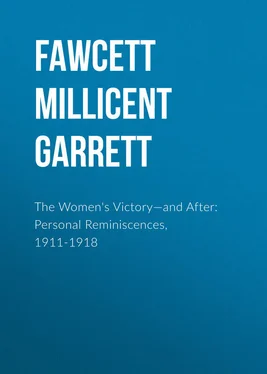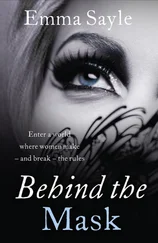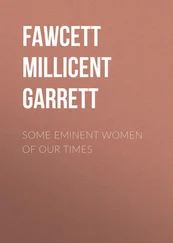Millicent Fawcett - The Women's Victory—and After - Personal Reminiscences, 1911-1918
Здесь есть возможность читать онлайн «Millicent Fawcett - The Women's Victory—and After - Personal Reminiscences, 1911-1918» — ознакомительный отрывок электронной книги совершенно бесплатно, а после прочтения отрывка купить полную версию. В некоторых случаях можно слушать аудио, скачать через торрент в формате fb2 и присутствует краткое содержание. Издательство: Иностранный паблик, Жанр: foreign_antique, foreign_prose, на английском языке. Описание произведения, (предисловие) а так же отзывы посетителей доступны на портале библиотеки ЛибКат.
- Название:The Women's Victory—and After: Personal Reminiscences, 1911-1918
- Автор:
- Издательство:Иностранный паблик
- Жанр:
- Год:неизвестен
- ISBN:нет данных
- Рейтинг книги:4 / 5. Голосов: 1
-
Избранное:Добавить в избранное
- Отзывы:
-
Ваша оценка:
- 80
- 1
- 2
- 3
- 4
- 5
The Women's Victory—and After: Personal Reminiscences, 1911-1918: краткое содержание, описание и аннотация
Предлагаем к чтению аннотацию, описание, краткое содержание или предисловие (зависит от того, что написал сам автор книги «The Women's Victory—and After: Personal Reminiscences, 1911-1918»). Если вы не нашли необходимую информацию о книге — напишите в комментариях, мы постараемся отыскать её.
The Women's Victory—and After: Personal Reminiscences, 1911-1918 — читать онлайн ознакомительный отрывок
Ниже представлен текст книги, разбитый по страницам. Система сохранения места последней прочитанной страницы, позволяет с удобством читать онлайн бесплатно книгу «The Women's Victory—and After: Personal Reminiscences, 1911-1918», без необходимости каждый раз заново искать на чём Вы остановились. Поставьте закладку, и сможете в любой момент перейти на страницу, на которой закончили чтение.
Интервал:
Закладка:
It is interesting now to look back at the N.U.W.S.S. report in the year 1912, and to see the care with which we defined our position. No Government candidate was to be supported, because the Government, under Mr. Asquith, had shown the most determined opposition to our enfranchisement. When a Conservative candidate was supported, it was because we deemed this the best way of securing the defeat of a Government candidate; when the Labour candidate was supported, it was made clear that this was done because the Labour Party was the only party which had made women's suffrage part of its programme, and had, moreover, rendered us the signal service of calling upon its parliamentary representatives to oppose any Franchise Bill which did not include women.
A society which disregarded such signal services as these could only be described as abandoning its non-party attitude and identifying itself with opposition to those who had shown themselves the strongest supporters of our movement.
It was not enough for us to put on record our intention of doing our best to strengthen the position of the Labour Party at by-elections; we also made plans to help Labour members to defend their seats at the time of a general election. A special committee was formed to organize the support of Labour candidates, and to raise a sum of money for this purpose. It was thus that the Election Fighting Fund was inaugurated in May, 1912. Two thousand pounds was at once subscribed in the room, before any special appeal had been made; and during the short time between the starting of the fund and the outbreak of the European War it was sufficiently replenished by constant gifts from our own members to enable us to keep up the work with vigour and efficiency. The fund had not been a month in existence before it was used in support of the Labour candidate at the Holmfirth by-election; and there were shortly afterwards three other by-elections – at Hanley, Crewe, and Midlothian – at which the Election Fighting Fund and its band of organizers and speakers were used in support of Labour candidates. We were authoritatively assured that the Liberals knew that they would have held the seats at Crewe and Midlothian had the attitude of their party been satisfactory on women's suffrage. In 1913 the E.F.F. work was put into operation at Houghton-le-Spring, Keighley, and Lanark; and in 1914 in North-West Durham, Leith Burghs, and North-East Derbyshire. There were therefore ten elections in all during the almost exactly two years in which the E.F.F. policy was vigorously worked by the N.U.W.S.S., and during which six seats, counting for twelve votes in a division, were transferred from the Liberal to the Conservative side of the House. We were very well satisfied by these results, although of course disappointed that no Labour candidate had won a seat: in every case, however, the number of votes recorded for Labour had greatly increased. We had a splendid band of first-class speakers and organizers to work in each constituency; and at each successive election the whole place rang with women's suffrage and our meetings were crowded and enthusiastic – very often much more crowded and enthusiastic than those of the candidates. In the first election the Liberal against whom we had worked got in, but his majority was reduced to less than half what it had been at the last contest. The next election was less satisfactory; but at the third, a seat formerly held by a Liberal by a majority of 1,704 was gained by a Conservative supporter of suffrage, and it was generally acknowledged in the district that the vigorous help of the N.U.W.S.S. was the deciding factor in defeating the Liberal candidate. The Labour candidate polled nearly double the number of votes which his party had secured at the last three-cornered contest, and consequently was the means of securing the defeat of the Government candidate. Our success at Crewe was followed by a still more notable victory in Midlothian, the famous seat won by Mr. Gladstone in 1879, and from that date looked upon as an impregnable stronghold of Liberalism. In September, 1912, the former Liberal majority of 3,157 was converted into a Conservative majority of 32, the Labour candidate, who stood for the first time, polling 2,413 votes.
It is unnecessary to go in detail through the rest of the elections in which the N.U. in 1913, and up to June, 1914, worked the E.F.F. policy for all they were worth; the specimens of which I have given details are indicative of the remainder. When we were originally discussing our change of election policy, Mr. H. N. Brailsford, who had warmly pressed it upon us, said to us, "The moment that you are able by your election work to transfer seats from one side of the House of Commons to the other, the Whips and the wire-pullers will begin to treat you with respect"; and we certainly found that this was the case. In every election in which the E.F.F. committee took part, women's suffrage was the main topic of the contest, and in every case, although we did not succeed in winning the seats for Labour candidates, the value of our work in their behalf was most warmly recognized. We never in any case subsidized the Labour candidates. Their independence was jealously preserved by their own party, and correspondingly respected by us; any attempt to infringe it would have been deeply resented. Our work in the constituency was strictly our own; we held meetings, organized processions and other demonstrations, and paid our own way with the funds our own members had subscribed for the purpose. We had nothing to conceal, nor had the Labour men for whom we worked.
The N.U.W.S.S. had always interpreted "non-party" to mean that the N.U. included members of all parties within its ranks. We therefore naturally chose as our speakers and organizers to carry out our E.F.F. work from among those of our members whose personal sympathies were with the Labour Party.
The whole movement had been a source of strength to our Union, and we were looking forward to further developments when all schemes for this object were cut short by the outbreak of war on August 4th, 1914. A special meeting of the E.F.F. committee was held immediately, and decided at once that during the war the Election Fighting Fund should be used to employ the E.F.F. staff for the time being on relief work only. This will be further described in a future chapter, which will deal with the general activities of the N.U.W.S.S. during the war.
CHAPTER IV
THE FIASCO OF THE GOVERNMENT REFORM BILL
"If we can't win as fast as we could wish, we know that in the long run our opponents cannot win at all."
– John Bright.We were at this time receiving a great deal of good advice from suffrage members of the Cabinet. One of them, who ought to have known better, advised us to rouse public opinion in our support. "Why," he said, "do you not hold a few meetings, and get good speakers, like Miss Royden, to address them?" We replied that we had held 4,000 public meetings in the last four months, filling the largest halls again and again, and that Miss Royden, never very robust, had nearly killed herself by fulfilling the constant demands that were made upon her for speeches at our innumerable demonstrations. She had spoken 267 times in the last twelve months. We reminded him that there had been no agitation at all by men for a wider franchise for themselves; there had been a persistent and strenuous demand by women for their own enfranchisement; and the only official reply of the Government was to promise a Bill for more suffrage to men, and no suffrage at all for women. All this was, of course, so much more grist to the mill at which we had to grind out perpetual speeches. This, as we did not fail to point out, illustrated the value of a vote: voters could get what they wanted without even asking for it; whereas the voteless had to devote years and generations, and to spend thousands of pounds, in order to voice persistent demands on the part of women for representation, demands which were as persistently and determinedly passed by unnoticed, and we were asked why we did not hold a few meetings! The House of Commons seems scarcely capable of giving intelligent attention to any subject unless it is forced to undertake the excruciating pain of thought by the demands made by voters in the constituencies. The most remarkable social revolution had been taking place for the last fifty years in the educational and professional and industrial status of women; all we asked was that a corresponding change should be made in their political status; but up to the present the only reply we could get from the Government had been rightly described by one of its members as "shuffling and delay."
Читать дальшеИнтервал:
Закладка:
Похожие книги на «The Women's Victory—and After: Personal Reminiscences, 1911-1918»
Представляем Вашему вниманию похожие книги на «The Women's Victory—and After: Personal Reminiscences, 1911-1918» списком для выбора. Мы отобрали схожую по названию и смыслу литературу в надежде предоставить читателям больше вариантов отыскать новые, интересные, ещё непрочитанные произведения.
Обсуждение, отзывы о книге «The Women's Victory—and After: Personal Reminiscences, 1911-1918» и просто собственные мнения читателей. Оставьте ваши комментарии, напишите, что Вы думаете о произведении, его смысле или главных героях. Укажите что конкретно понравилось, а что нет, и почему Вы так считаете.












